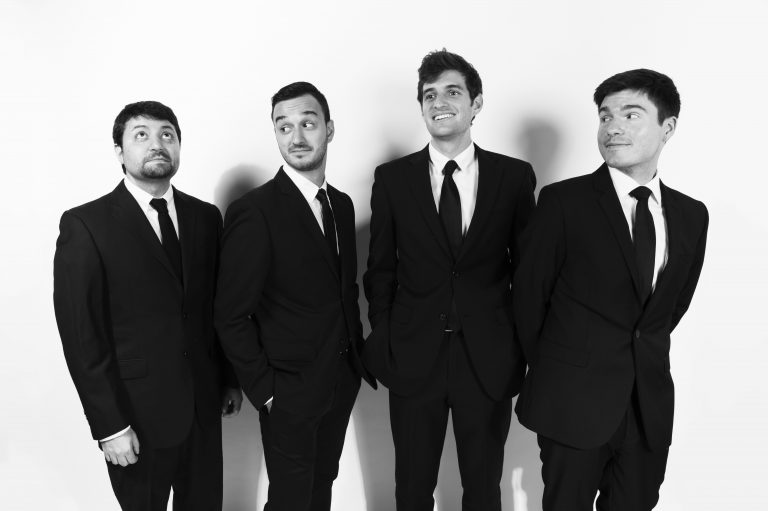Sandbox Percussion brings back live (and loud) music to Dumbarton Oaks

Sandbox Percussion performed Sunday night at Dumbarton Oaks. Photo: Kjell van Sice
As the world tries to move past the Covid pandemic, more of Washington’s classical music venues are opening their doors again. The latest presenter to return was the Friends of Music series, now known as Music at Dumbarton Oaks. On Sunday night an audience of about fifty heard a concert by Sandbox Percussion, who gave the last public performance in the museum’s beautiful Music Room, back in March 2020.
The program opened with Pattern Transformation by Lukas Ligeti, the son of composer György Ligeti. Sandbox has recorded the work since playing it on their first concert ten years ago. The four musicians played the piece on two marimbas, one rising figure imitating the other in slightly different rhythms, a polymetric style inspired by court music from Uganda. The music calmed slightly near its midpoint, with all four players striking slow notes together.
Sandbox plays most music from memory, as they did with the Ligeti piece and the second work, Sonata by Jonny Allen, who is also one of the group’s members. The four players gathered around a single vibraphone but added drum and other sounds as well. The piece contrasted a first theme, built on a descending chromatic scale, with a softer second theme in which the extraneous instruments fell silent. The musicians coordinated their movements at close quarters, especially the bowed section, with balletic grace.
Formed ten years ago and based in Brooklyn, Sandbox has expanded the percussion repertoire through partnerships with composers. The group gave the world premiere of half of Rational People, a work by Tawnie Olson planned for a full premiere when it is completed. The composer described her inspiration as forms of modern communication like social media, in opposition to Goethe’s description of a string quartet as “four rational people conversing.”
The movement called “Muting” featured metallic sounds from three players that gradually grew louder and more clashing. The fourth musician gently rubbed sand blocks together, making a sound like crashing waves that periodically seemed to silence the contentious voices and restore calm. The pattern repeated with two players switching to a bass drum that was also “muted” by the sand blocks.
In “Trolling,” a woodblock ostinato was offset by accents from marimba and glockenspiel. Drum strikes off the beat upset the conversation, perhaps one kind of mean Internet “trolling.” In a second section, set to a faster pulse, vibraphone and bowed marimba established a pleasing groove, driven to a big finish on drum.
Sandbox had planned the New York premiere of the evening-length work Seven Pillars, by their regular collaborator Andy Akiho, for April 2020. Coronavirus forced them to delay that performance, but the group has since recorded the work, on a disc released last September and also available in a video version.
Again playing without music, the ensemble performed two movements from this daunting piece. In the crazy “Pillar VI,” a marimba pulse created ricochet reactions from the other musicians. The music proceeded in often frenetic spasms and irregular patterns. In the final section, a slower tempo prevailed, which gradually calmed and faded into silence. “Pillar V” had a more industrial feel, with an insistent rhythmic pulse driven by factory-like metallic sounds and surprise drum strikes. After softening in a more serene middle section, multiple pedal-activated drums spun the piece out of control to its harried conclusion.
Akiho’s Haiku 2 provided a moment of whimsy to start the second half. At the end of each haiku-inspired 5-7-5 beat cycle, one of the four players left the pitched instruments they were gathered around. Taking up a motley assortment of unpitched instruments one by one, including a kitchen pot lid, an empty wine bottle, a ceramic pot, and a woodblock, they walked in a circle around the others. When all four had switched instruments, they lined up facing the audience for a clattering finish.
The most complex work on the program was the other world premiere, Verses for a Liminal Space by David Crowell, a musician-in-residence at Dumbarton Oaks. (A short delay was caused by one of the musicians searching high and low for the pedal to turn the pages on his tablet.) With two musicians seated at drum kits and the other two on vibraphones, the piece pulled the ear in multiple disorienting directions with polyrhythms in overlapping patterns.
As instruments dropped in and out, some of the players moved about, jangling ankle bells or rattling shells, sounds that added a shamanic element to the work. What was initially like a mellow rumble of chaotic chatter grew into chaotic tumults, which receded to more serene passages. The clangor of the vibraphones especially, allowed to ring with the pedal, created organ-like sonorities that vibrated through the brain long after the piece ended.
A beloved classic, Steve Reich’s Mallet Quartet from 2009, concluded this adventurous program with a tour de force performance on two vibraphones and two five-octave marimbas. The marimbas, with their lower and softer timbre, took over in the middle movement, providing a respite from the clanging vibes. The small Music Room at Dumbarton Oaks may not be large enough to accommodate such a racket comfortably for those with sensitive ears.
Music at Dumbarton Oaks will soon announce a complete schedule for their 2022-2023 season at Dumbarton Oaks. doaks.org
